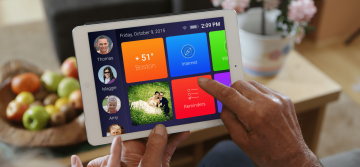Making clear the difference between Oscar Enterprise and Oscar Family
June 24, 2020

The thing is that people still confuse our remote care platform for caregiving businesses with the app for families and their elderly family members. And we don't blame them. But it is just about time to make clear that Oscar Senior and Oscar Family are not the same thing. Learn more to find out which one is a better fit for you.
What's the story
Some of you might know that Oscar Senior started as a company a long time ago. Firstly, it was only simple app for families that allowed them to stay in touch with their elderly family members despite long distances. The video call feature was quite crushy and the app allowed the elderly to play chess only.

Tomas Posker highlights the benefits of remote elder care at conferences around the world.
xx
Our platform for remote elder care is used mainly by caregiving companies abroad where the distances between caregivers and care recipients are larger than in the Czech Republic. However, even in the Czech Republic, Oscar Senior already helps the city of Jeseník as an easy-to-use app for Senior Taxi.
For example, seniors can easily order a taxi ride to the doctor and back immediately and they can even choose their driver. Beforehand, they had to order the ride at least 24 hours earlier and there was only one driver available paid by the city. The Oscar Senior app allows the city to cooperate with all the taxi drivers they have available in the area so the whole service is now ready and available during days and nights, too.
Oscar Senior is also implemented in one caregiving company that uses the platform for online video calls with care recipients instead of regular personal visits. They wanted to be able to stay in touch with the care recipient rather than to visit them once every two days.

In the app for seniors, our most important considerations were to create an intuitive interface and to make the buttons big enough - seniors usually struggle with handle tremors.
In general, the tools for remote care help caregiving organizations increase efficiency and save resources. In the US, caregivers spend about 19% of their time traveling to the clients and about 20% these visits last only up to 15 minutes. That is a significant waste of time because such short visits can be done over video calls and other apps enabling the caregiver to e.g. set up meds reminders, fill in prescriptions or do exercise online. The caregivers and seniors just need a smartphone or a tablet and suddenly, care providing organizations can save one working day of each caregiver per week. That is a lot of time they can use to focus on truly urgent personal visits or new care recipients.
So why hasn’t technology conquered the care industry before?
Caregiving organizations don't have the budget
A lot of initiatives emerged in the Czech Republic and abroad that support families and family caregivers to stay in touch with grandparents even during social distancing in quarantine. But the situation is different for caregiving organizations. Even before the corona crisis it was very difficult for them to find a budget for any investments or new technology.
Issues with financing professional care providers are even bigger in the Czech Republic than in the US, Great Britain or Australia. Today's generation of elderly (and their kids) isn't willing or able to pay for private care so they end up in caregiving facilities.

Adaptation of new technology for seniors is a bit slower and more fearful in the Czech Republic than in other countries. But Czech cities might want to get inspired by the progressive city of Jeseník. The city councillors of Jeseník decided to make life easier for their elderly citizens by offering an easy-to-use app so they can order a ride with Senior Taxi right away without having to wait.
Financing care facilities is complicated and overregulated. The money comes from many fragmented sources and the state also defines the maximal fees for provision of certain services. However, these fees don't usually cover even the bigger part of operating costs and they also do not help create a competitive environment.
Caregiving facilities often just simply don't have the budget to implement technological gadgets however beneficial these could be for their businesses..
Nevertheless, the pandemic has now pushed care providers and basically forced them to find time and resources for implementing technological tools for remote and online care. If they didn't do it they would fail to deliver anything they promised to their care recipients and their families.
Will technology keep its place in the caregiving industry even after the crisis?
Who knows. We are now offering our Oscar Senior platform for two months free of charge. But the question remains - will caregiving organizations be willing to pay for technological gadgets after the coronavirus crisis? I still believe that when they see how much time and financial costs they can actually save with such a platform for remote care they will be more willing to find some money in their tight budgets. Even though the platform doesn't cost a fortune, it still is a hit to the tight budgets of elder care providers. And often they simply cannot afford it.

Tomas Posker is CEO of Oscar Senior, a platform for remote care used by elder care providers and Oscar Family app for families so they can easily stay in touch with their elderly relatives living far away. As an ambassador of Aging2.0, Tomas leads the discussion about aging and related topics with the community and professional public.
Keep reading:
4 reasons why video chat is popular among seniors
Video chat is not only something youngsters do. Many seniors have discovered the amazing benefits of being able to connect to others online from their own living room. Read more to find out reasons why video chat is popular among seniors.
5 tips on taking care of older adults while socially distancing due to coronavirus
Older adults are the most vulnerable group when it comes to disease COVID-19. Elder care companies must act to keep their employees and care recipients safe. Read 5 tips on how to protect the elderly from coronavirus as a caregiver or care provider.
5 tips on quick mental hygiene for caregivers
As a caregiver you are at a heightened risk of suffering from mental health problems such as anxiety and depression. Take care of yourself so you can take care of others. Read five tricks on how to keep your sanity as a professional caregiver.



